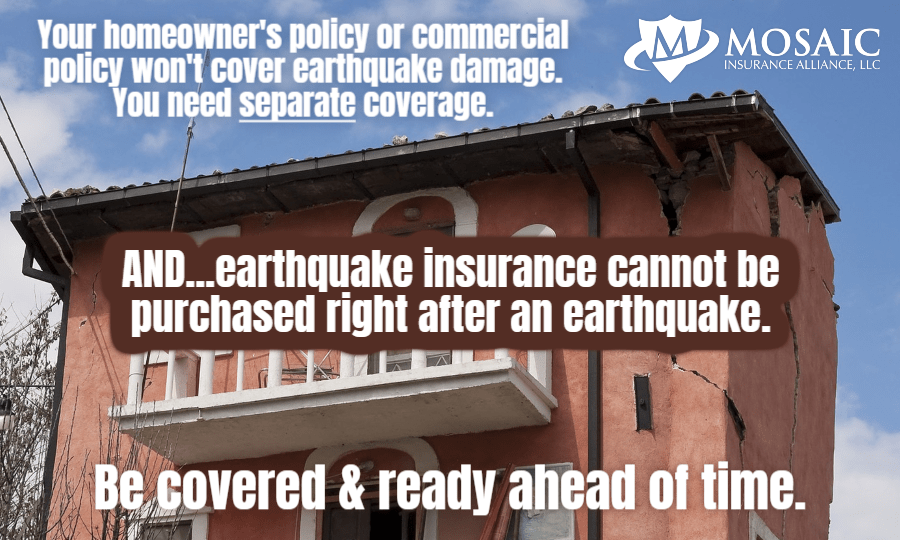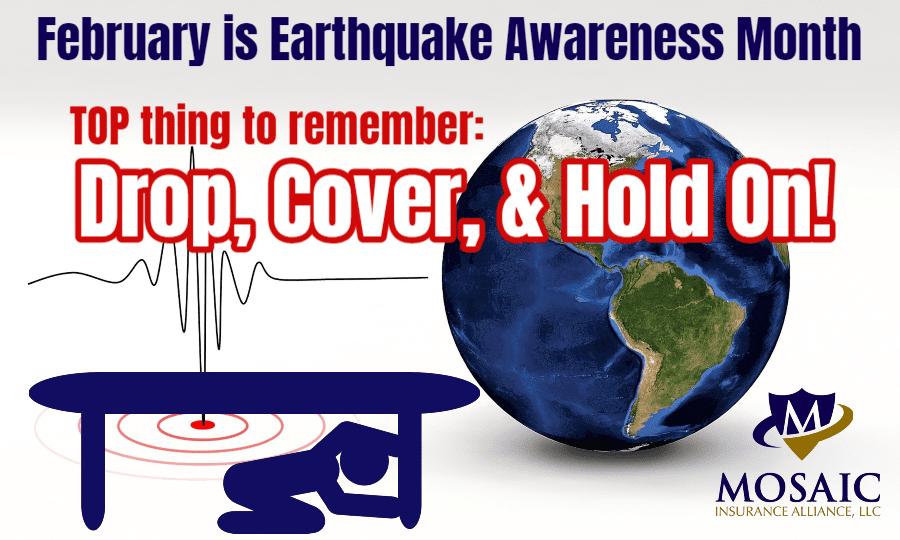February: Earthquake Awareness Month
When was the last earthquake you experienced? Did you feel like you were anxious and caught off guard—not sure what to do? Mosaic Insurance Alliance wants to make sure that you have all that you need to protect and secure what matters most to you.
The fact of the matter is that it is not time to prep for a hazard while it is happening…or after the fact. And, regrets are never a fun feeling, so why not have an action plan to help avoid them?
Accidents happen, and when they are all said and done, having had information and coverage you need will leave you with less stress and mess. In addition to providing earthquake insurance for your personal and commercial property, we have gathered some helpful tips and resources you can use to help ensure that you are ready.
Top Questions to Ask Yourself:
- Do you have a before, during, and after plan for your family to follow if an earthquake occurs?
- Has everyone practiced the plan and know what to do in common earthquake situations?
- Does everyone know how to help others remain calm and safe?
- Is all your property safe, secure, and prepared for a possible earthquake?
- Do you have the insurance you need to protect your home, car, business, and other property?
What’s next? Information is one of the best tools out there. Below are some helpful tips to help you assess your situation, see what action steps you need to take next, and determine what additional questions you need to ask so that you can be on top of things.
Before an Earthquake:
- Create an emergency plan that is known by everyone who lives in your house or visits it often, focusing on what to do and where to go during and after.
- Practice earthquake drills—such as drop, cover, and hold on—on a regular basis.
- Know what you need to do if you or someone you know has a disability (in a wheelchair, using a walker, etc.) The Center for Disease Control and Prevention has some disability earthquake tips.
- Make sure that your house is safe. For example:
- Avoid clutter in all areas of your house.
- Have a clean closet that does not have heavy objects overhead so you could use it for shelter if needed.
- Make sure that heavy objects are secure (bookshelves, big wall decorations, cabinets, mirrors, etc.)
- Don’t place heavy objects near exits or sitting areas (couch, bed, dinner table, etc.)
- Make sure the foundation, floors, and walls are stable and not damaged (no rotting, cracking, tipping, etc.)
- Have multiple areas where you and others can be protected in case of an earthquake, such as multiple sturdy tables and desks. For other ideas on where to hide in your home, at work, outside, or in your car, click here.
- Gather as much information as possible and share with others. For example, if you own a business, are an employee of a school, are around children often, or work in a public area that has many people, ShakeOut.com is a great resource for you. They have all kinds of earthquake manuals by state, and they run all kinds of drills that you can participate in.
During an Earthquake:
- Get to shelter ASAP.
- Do not go into an elevator.
- Drop, cover, and hold on.
- Make sure that your head and neck are protected.
- Know the places you frequent often. Look up what to do in certain geographical locations and different types of buildings. The United States Department of Labor has a hazard map that can help you determine your possibilities of an earthquake. Also, Mark Benthien, Director of Education at Southern California Earthquake Center, has different tips regarding structures that you might find useful.
After an Earthquake:
- Evacuate your location if necessary.
- Expect there to be aftershocks.
- Assess your condition and that of others. Are you all ok? Do you need medical assistance?
- You can list yourself as safe and well on the American Red Cross website after an earthquake here. They also have a list of things to do to prepare for emergencies, and a video with tips for what to do during an earthquake.
For more information on what to do before, during, and after an earthquake, visit Red Cross’ Earthquake Safety Guide that has great tip lists and videos for each of the three sections.
Should I Get Earthquake Insurance?
Are you in an area that has many earthquakes? Or, perhaps in an area that could experience significant ones that could result in costly damages? If you are interested in exploring earthquake coverage, we can find the insurance policies you need for your personal property and business. You can give us a call at 425-320-4280, or fill out our Get a Quote Form!
Here are some top things that you need to know about earthquake insurance:
- As said by the Washington State Insurance Commissioner, “Your homeowner’s policy won’t cover earthquake damage.” If you experience any kind of damage from an earthquake to your personal or business property—house, company building, land, car, etc.—it will only be covered if you specifically have earthquake insurance.
- In Washington state, all earthquakes that occur within any 72-hour period will be considered the same earthquake and subject to only one deductible. Please note that definitions and laws can vary by state. Ask your indepentent agent for more information on your location, or visit the insurance commissioner website for your state.
- The sale of earthquake insurance in Washington will be suspended by an insurance company following an earthquake. This is to avoid last-minute purchases of earthquake policies after a small earthquake occurs. Often times, a bigger earthquake follows a small one, and the suspension is in place to avoid people trying to rush to get insurance before the bigger one occurs. So, if you think that you might ever need insurance, make sure that you have coverage beforehand.
- If you are looking for more information for Washington earthquake insurance, give us a call, or visit the Washington State Office of the Insurance Commissioner website. Their main earthquake insurance page has frequently asked questions (FAQs).
What matters most to you, matters most to us. Safety is a top priority, and Mosaic wants to make sure that you have all you need to achieve a safe home, workplace, car, and more. If there is a topic that you think that we could write a piece on to help spread safety awareness to the public, don’t hesitate to reach out! Our Marketing Manager, Meagan, is always ready to create new content that will help our followers and their families. You can reach her at: Meagan@mosaicia.com .


